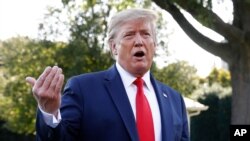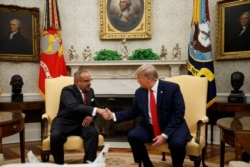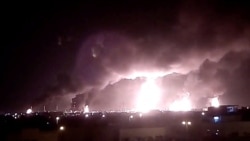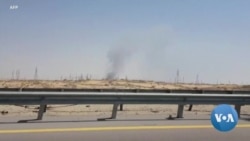U.S. President Donald Trump says any American military attack on Iran would be proportionate to the attacks carried out on oil facilities in Saudi Arabia.
Speaking to reporters on the South Lawn on Monday afternoon, Trump, asked about Secretary of State Mike Pompeo directly blaming Iran for the attack on the Saudi installations, replied: “I think we're the same. I think we just want to find out the final numbers and see.”
The president added that it would be known who is responsible “for certain over the next pretty short period.”
Earlier in the afternoon, Trump told reporters in the Oval Office during a meeting with the crown prince of Bahrain, Salman bin Hamad bin Isa Al Khalifa, that while he does not want war with Iran, “The United States is more prepared” for a conflict than any country in history.
“With all that being said, we’d certainly like to avoid it,” added Trump.
Diplomacy is never exhausted, said Trump who was also asked by reporters if he had promised the Saudis that the United States will protect them.
“No, I haven’t promised the Saudis that,” responded Trump. “We have to sit down with the Saudis and work something out.”
The president announced that Pompeo and other U.S. officials will travel to Saudi Arabia.
The attack on the Saudi facilities and worries about a widening conflict in the region caused oil prices to rise about 15% on Monday.
"We have tremendous amounts of oil in our country," Trump said on the South Lawn in response to a VOA question about the ramifications of the spike in the cost of crude oil.
"It won't affect us and ultimately I don't think it'll affect the world either but it won't affect the United States," added the president.
Trump also noted the strategic reserves of U.S. oil that he could order released.
Earlier in the day the president met at the White House with U.S. military leaders.
After the meeting, Defense Secretary Mark Esper said: “The United States military, with our interagency team, is working with our partners to address this unprecedented attack and defend the international rules-based order that is being undermined by Iran.”
A Saudi military spokesman said an initial investigation suggested that “Iranian weapons” were used in the attack.
Iranian-backed Houthi insurgents in Yemen claimed responsibility for the attack that cut Saudi daily oil production by 5.7 million barrels, but Pompeo, without offering any evidence, blamed the Iranians, dismissing the possibility that the attack came from Yemen.
Iraqi news media reported the attack was launched from southern Iraq, where Iranian-backed militias wield some power, although the Iraqi government rejected the possibility that its territory was used as a launchpad.
Trump on Sunday evening on Twitter stated that American forces were 'locked and loaded' to respond.
Iran has called accusations it is behind the attack, “maximum lies.”
The Senate Foreign Relations Committee’s chairman, Republican Jim Risch, in a statement, is warning Tehran that it “should not underestimate the United States’ resolve. Any attack against U.S. forces deployed abroad must be met with an overwhelming response – no targets are off the table.”
A Democratic Party member of the committee, Chris Coons says if Trump “wants to take any military action in response to the attacks, he needs to brief Congress on the relevant intelligence and make the case to Congress and the American people that a military response is necessary and justified. “
Coons, in a statement, said military force should be the last resort.
“If intelligence proves Iranian responsibility for these recent attacks on Saudi Arabia, we should weigh our options carefully and consult with our regional and European allies and partners, which will only strengthen our response," said Coons.
Ali Shihabi, the founder of the Arabia Foundation, told VOA that the likely targets in Iran for the United States or Saudi Arabia "would be refineries and critical oil facilities."
Shihabi says, despite Trump's tweet, it is not about Riyadh "deciding," that any action the Saudis take "in retaliation across the Gulf will expose U.S. troops and facilities to Iranian attack, so it has to coordinate with the U.S."
Middlebury Institute of International Studies scholar Jeffrey Lewis contended that Trump leaving the decision to the Saudis "is pathetic."
Lewis, the founding publisher of the Arms Control Wonk blog, told VOA the U.S. president is "clearly leaving himself an out" – so he can declare that he "wanted to retaliate, but it was the Saudis who said no."
Lewis added that Trump "likes to talk tough and I can't rule out something symbolic, but I don't think he has the stomach to start a war."
The attack, which some analysts suspect might have been a precision attack with cruise missiles from Iran or Iraqi territory, on Saudi Arabia's Abqaiq plant and the Khurais oil fields before dawn Saturday, caused massive fires.
Saudi officials are scrambling to restore operations – which could takes weeks or months -- and say they would tap into the country's reserves to keep deliveries coming.










